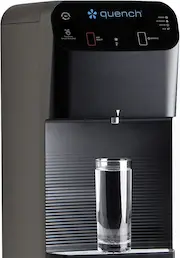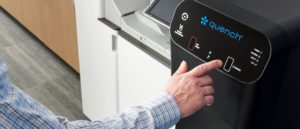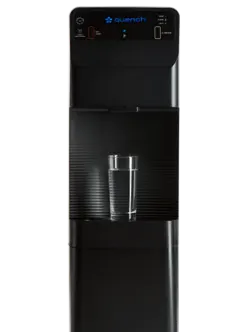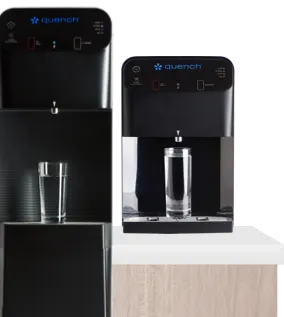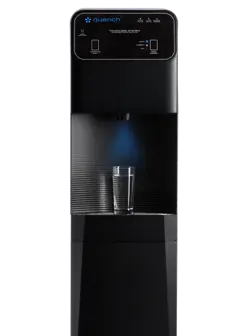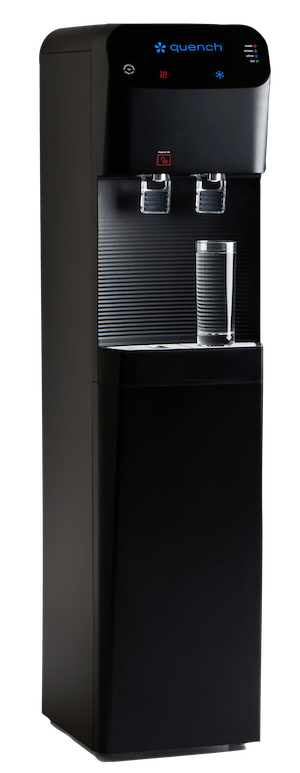Most business leaders recognize the critical need to boost hydration at work. But, whether you realize it or not, the cleanliness of your workplace water system makes a considerable difference both in how your employees feel and how your business performs. This has quickly emphasized the need to pursue purified drinking water for organizations across industries today.
Read on for a closer look at pure water and the key benefits your teams can reap by taking plain water to the next level with a purification system.
What’s Considered “Pure Water?”
Organizational leaders looking to improve their workplace water quality may be surprised to learn that tap water sources might not be as clean as they assume. And, while all drinking water may be reasonably expected to contain at least small amounts of contaminants, higher levels can quickly lead to negative health impacts on your valuable team members and consumers.
While it’s unlikely that all of the following impurities will be found in your public drinking water, here are some of the most common contaminants that affect water supplies today:
- Toxic chemicals (e.g., chlorine and fluoride)
- Microorganisms (e.g., bacteria or viruses)
- Heavy metals (e.g., Lead, arsenic, and chromium)
- Radon
- Microplastics (e.g., BPAs)
- Dissolved organic compounds and gases
The Risks of Drinking Contaminated Water
Promoting hydration in the workplace is a key factor in improving performance and productivity and, as a result, your bottom line. But, providing your employees and customers with drinking water that contains high levels of impurities can have detrimental health impacts in the long run. In fact, Frontiers reports that poor drinking water quality causes more than 50 kinds of diseases. Some of these diseases and other negative health effects include:
- Diarrhea
- Vomiting
- Headache
- Fever
- Liver and kidney damage (or failure)
- Reproductive damage
- Cancer
Introducing Pure Water
So, what exactly is purified water? This type of drinking water has been mechanically filtered or processed to completely remove impurities — from chemicals and harmful contaminants to dissolved solids and more — to ensure it’s suitable for use.
Does that mean filtered water and purified water are one and the same? Essentially, no: All purified water is filtered or distilled, but not all filtered water is purified. This is the case because water can go through different processes, such as carbon filtration or sediment filtration, to be considered “filtered water.” And for business leaders, filtration gives you the reassurance that your workplace drinking water contains impurity levels that will presumably have no long-term impact on health.
Purification, on the other hand, requires distillation or reverse osmosis (RO) filtration to strip water down to the molecular level — completely ridding water sources of contaminants, heavy metals, and dissolved solids for the cleanest result. These impurity levels, or lack thereof, can be found in the form of either purified water or distilled water.
Distilled Water vs. Pure Water
Before determining the type of drinking water that’s best suited for your workplace hydration needs, it’s critical to distinguish distilled water from pure water. Distilled water is a type of purified water that’s created through the distillation process. This involves the conversion of a liquid into a vapor that’s subsequently condensed back into a liquid form, thereby separating out all impurities and other solutes.
You might be wondering, “If both are free from chemicals and pollutants, then what’s the difference?” Put simply, pure water is differentiated because it’s created differently — through reverse osmosis filtration. The RO water purification process uses a semipermeable membrane to separate ions, unwanted molecules, and larger particles from drinking water, including contaminants, sediments, and dissolved solids. According to the International Water Association, this effectively removes up to 99.99% of all contaminants, including minerals, from your water supply to leave a purified result.
The Top Benefits of Drinking and Providing Purified Water at Work
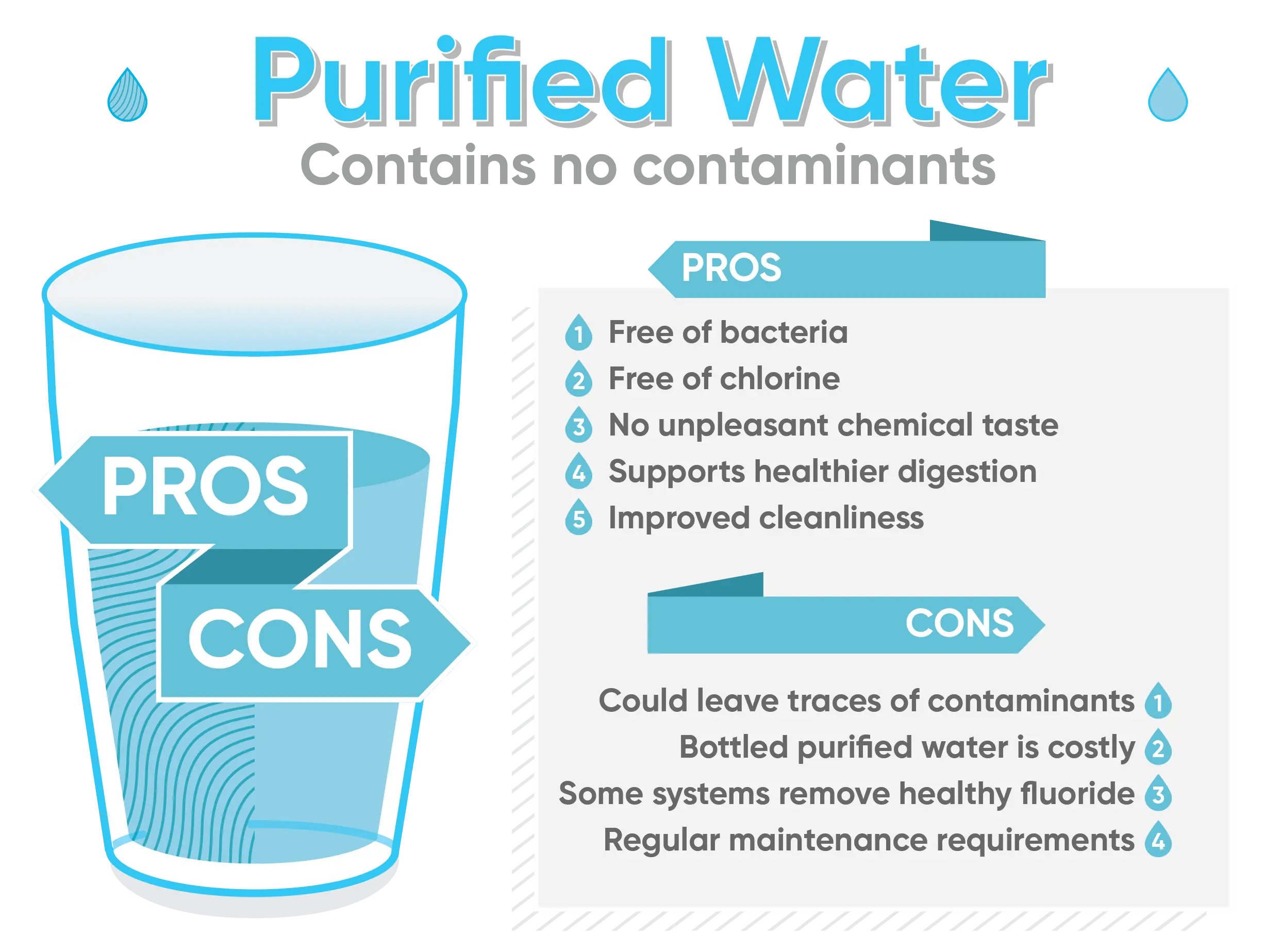
Offering purified water at work is ultimately valuable for both employees and long-term business operations. Here’s an overview of what organizations can expect:
Health Benefits for Employees
- Aids in digestion and internal functions: Because pure water is devoid of chemicals and contaminants, it’s effective at breaking down the molecules from digested food to promote nutrient absorption. What’s more, consuming clean water supports kidney and liver functioning, helping employees feel their best.
- Boosts energy levels: As purified, great-tasting water improves hydration across your workforce, employees will be well-equipped to maintain high energy levels and fight fatigue throughout the workday.
- Promotes weight loss: According to Healthline, studies show that drinking a lot of clean water on a daily basis helps burn calories — which is known as resting energy expenditure. While the effect of this can vary from person to person, research indicates this can lead to modest weight loss. On top of that, pure water that tastes great and is easily accessible at work can even potentially steer employees toward healthier lifestyle choices in general.
- Mitigates the consumption of harmful contaminants: One of the major reasons employers opt for a purified drinking water system is to minimize the impurities that employees and guests consume on a daily basis. Helping workers and customers avoid dangerous pollutants contributes significantly to their long-term well-being.
Resulting Operational Advantages
Focusing on employee wellness is critical in the modern workplace, and the health advantages that purified water can offer speak for themselves. However, your workforce and customers aren’t the only stakeholders that stand to benefit from being offered pure water at work. Your business can see value in the form of the following:
- Greater hydration: Whether organizational leaders recognize it or not, hydration is a key element of business success. This is because proper water intake is the foundation of high-quality employee performance, which is critical to maintaining positive outcomes.
- Boosted employee morale: Drinking enough water throughout the day is critical for workers to stabilize their mood and maintain morale. Because dehydration saps your brain’s energy and serotonin production, drinking water alleviates depression, anxiety, and stress.
- Improved productivity and efficiency: Helping your workforce consume the right amount of water each day will be a linchpin in mitigating symptoms that impact productivity, such as headaches, loss of concentration, and tiredness.
- Increased focus and cognition: Considering our brains are 73% water, it stands to reason that water intake can considerably influence cognition. Encouraging hydration at work by offering purified water improves brain health, which, in turn, strengthens concentration and supports memory function.
Disadvantages of Drinking Pure Water — Considering a Bottleless Water Alternative
While the health benefits of purified drinking water are clear, there are a few drawbacks to take into account. These shortcomings include:
- Leaving traces of contaminants: Water purification is a useful method for mitigating impurities in water at work, but it’s not always as effective at removing contaminants as the distillation process.
- Minimizing levels of fluoride: Fluoride has been added to public drinking water for decades now to support dental health, but some purification systems can remove healthy levels of this trace mineral. Luckily, people today aren’t solely reliant on water to consume adequate amounts of fluoride: major sources also include food and fluoride-containing dental products.
- Filtering out other essential minerals: Fluoride isn’t the only mineral that’s removed in the purification process: Generally, all organic and inorganic minerals are as well. Minerals are vital to support the well-being and functioning of our bodies, and long-term deficiencies can mean a variety of health problems moving forward.
Making The Switch to a Bottleless Dispenser With Advanced Filtration and Mineral Addback Technology
So, what can your organization do when you want to ensure your team members and valued customers have access to clean water on-demand that lowers costs and maintains a sufficient mineral content? You can consider a bottleless water dispenser alternative from Quench®.
Quench Purifies Your Water, Then Adds Back Minerals
Quench bottleless water coolers purify your water and then add back minerals to help your organization keep employees, customers, and guests happy, healthy, and hydrated.
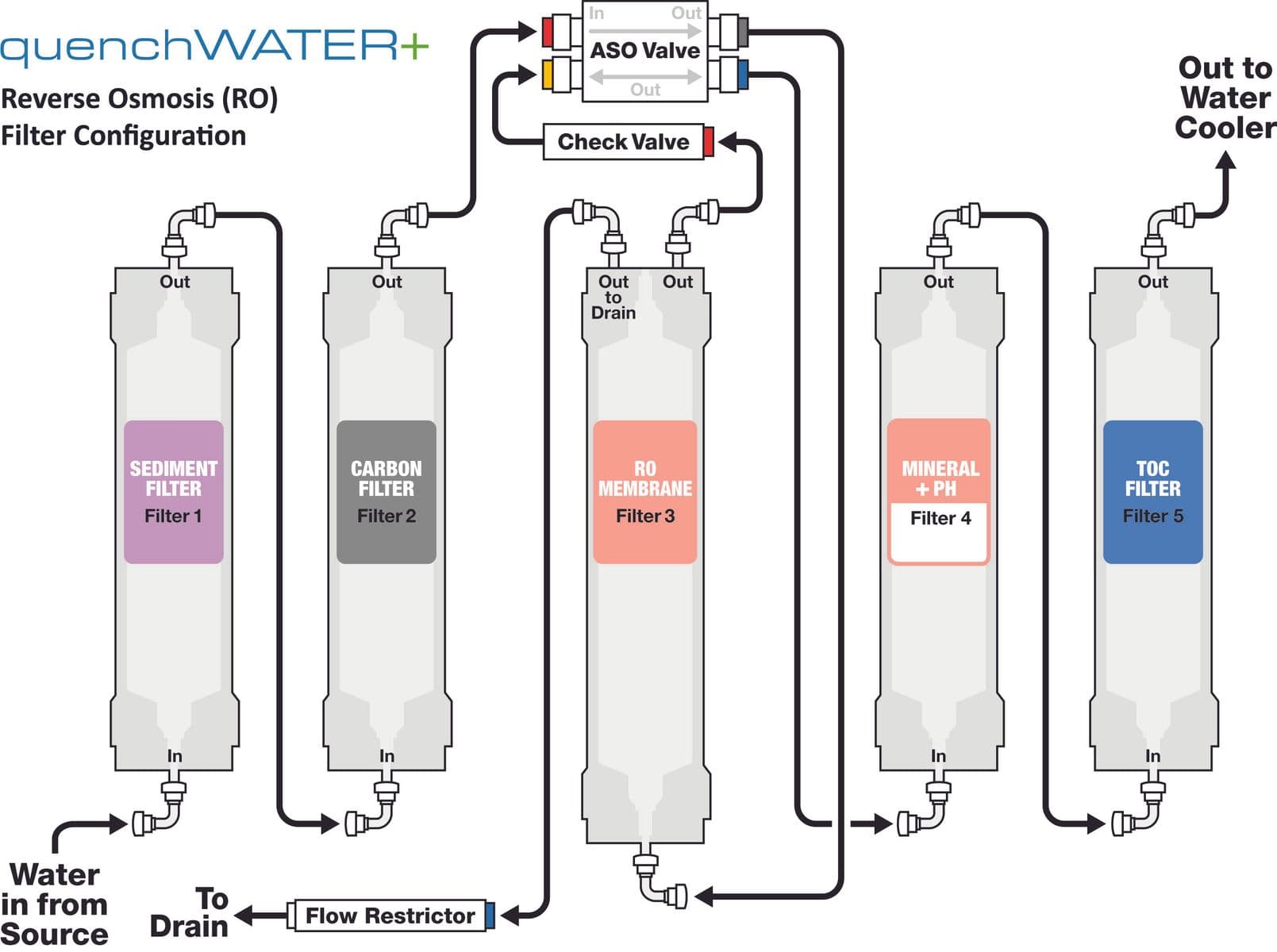
Some of our most popular bottleless dispensers provide quenchWATER+, taking on-demand water to the next level through a 5-filter setup, including reverse osmosis filtration. This effectively removes up to 99.99% of all contaminants from your water, then adds back healthy minerals your body needs to stay hydrated for longer. With these systems in place, teams can rest assured that the RO water from a Quench bottleless cooler has a great taste and beneficial minerals needed to support health and hydration. How? Our cutting-edge technology adds dissolved healthy minerals and electrolytes like calcium, magnesium, potassium, and sodium back into the water for flavor and enhanced hydration.
Ready to introduce clean, mineral-infused, and electrolyte-enhanced alkaline water? Try our product finder to discover the machine that suits your business needs, or get a free quote to get started.
